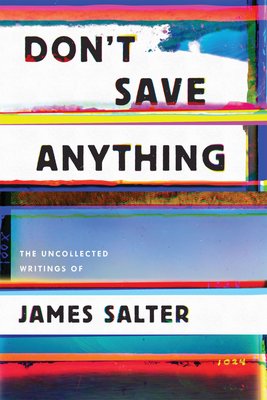
James Salter’s advice to writers was “Don’t save anything.” We can be thankful that he didn’t follow his own advice.
His posthumous book, “Don’t Save Anything: Uncollected Essays, Articles, and Profiles” (Counterpoint Press, $26, 303 pp.), is a collection of nonfiction pieces that were published in a variety of magazines but never collected between two covers. The editor of the book is Mr. Salter’s widow, Kay Eldredge Salter, who, in a preface, describes going through the more than 30 boxes of articles he had saved.
Mr. Salter, of course, is one of the greatest American fiction writers of the 20th and 21st centuries. At times, his prose has the spare understated concision of Hemingway; at other times, a rich sensuality that reminds us of Lawrence Durrell. His novels, “A Sport and a Pastime” and “All That Is,” are sure to last in the way that Flaubert or Maupassant have lasted, a comparison that the Francophile Mr. Salter would appreciate.
The collection contains essays about Aspen, where he lived for half the year, the other half being Bridgehampton. Salter was an avid skier and wrote the screenplay for “Downhill Racer,” which starred his friend Robert Redford.
He writes about his experience as a pilot in the U.S. Air Force, a career that he gave up when his second novel was published. And he writes about West Point and the arrival of female cadets.
Salter’s friend Robert Ginna was the first editor-in-chief of People magazine and asked him if he would contribute to the magazine. Ginna sent him to Switzerland to interview Vladimir Nabokov, England to interview Antonia Fraser, and France to interview Graham Greene. These were his first journalistic assignments.
Only Lady Antonia did not present some difficulty. Nabokov would not allow him to take notes or record the interview, and Greene avoided meeting him entirely, acceding only when Salter slipped a handwritten note under Greene’s door. These writers were very much admired by Salter.
Among the dead, he admired Isaac Babel, who wrote “The Red Cavalry Stories.” Babel’s stories combined “startling beauty and great violence” in equal measure.
The book contains an essay on the artificial heart and its inventor, Robert Jarvik. The article has an amusing aside. Every genius has moments of eccentricity: Jarvik liked to cook completely naked and insisted that his dinner guests dine in a similar state of nature.
The book contains several essays about West Point, from which he graduated, and the first women cadets. There is also an admiring essay about Dwight Eisenhower.
He was fascinated by the movies of the great European directors, and besides writing screenplays he also directed movies himself. He loved France, particularly Paris: French literature, French food, French movies, French wine.
But, most of all, he loved literature—writing it, reading it and talking about it.
“The thing that is marvelous,” he says, “is literature, which is like the sea, and the exaltation of being near it, whether you are a powerful swimmer or wading by the shore. The act of writing, though often tedious, can still provide extraordinary pleasure.” In the book’s first essay he speaks of literature as “the river of civilization, its Tigris and Nile.”
He exults in the power of language. “In the richness of language, its grace, breadth, dexterity, lies its power. To speak with clarity, brevity, and wit is like holding a lightning rod.”
In a final essay, he writes about the deterioration of the importance of literature in the general culture. “Who can recall the last time the publication of a book that might reasonably be called literature—that aspired to more than an extended author’s tour and a celluloid afterlife—raised the nation’s hackles or lifted it spirits or shook its premises? … The truth is we are less interested in words’ beauty these days than in their ugliness. The perceived insult to physical condition or sex or race rouses us easily, mechanically. We’re not so conditioned to respond to what is uncommon and miraculous.”
The essays in “Don’t Save Anything,” with a few exceptions, are largely workaday journalism, but they are superior to the finest writings of almost anyone else. They are “uncommon and miraculous.”